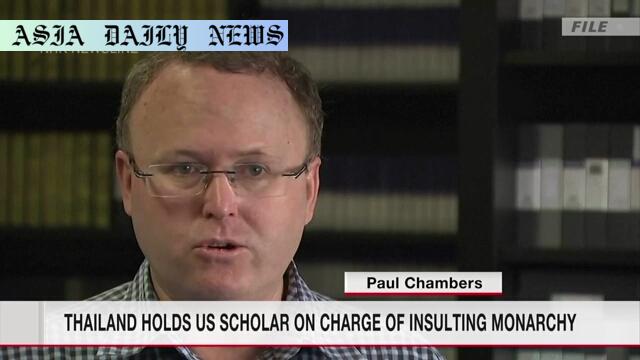Lese-Majeste: An American scholar in Thailand faces arrest for allegedly insulting the monarchy, reflecting rising prosecutions.
Lese-majeste law imposes up to 15 years in prison for violations.
American scholar Paul Chambers arrested over monarchy insult charge.
US State Department monitoring the growing misuse of the law.

Thailand’s Strict Lese-Majeste Law and Its Implications
Thailand’s lese-majeste law, considered one of the strictest in the world, criminalizes speech or actions deemed insulting to the monarchy. The penalty for a single offense can lead to imprisonment for up to 15 years. Although initially targeted at overt political dissent, its usage has ballooned in recent years, often sparking global criticism for its misuse to suppress free speech.
The recent arrest of Paul Chambers, an American academic affiliated with Naresuan University in Thailand, exemplifies the law’s stringent application. Chambers reportedly faced charges stemming from an innocuous webinar invitation linked to a Singaporean think tank. The invitation included comments about the role of the monarchy in certain defense appointments, but Chambers’ involvement in its creation remains unsubstantiated. His legal team maintains his innocence, pointing out that Chambers neither authored nor endorsed the statement on the website.
Chambers’ case underscores ongoing tensions between academic freedom, political discussion, and laws protecting the monarchy in Thailand. His denied bail and immediate imprisonment have drawn criticism globally, especially as the situation echoes a sharp increase in lese-majeste prosecutions coinciding with the broader protests against the monarchy in recent years.
International and Domestic Reactions
The incident has not gone unnoticed internationally. The United States State Department has expressed concern, closely following the developments. Meanwhile, human rights groups have continued to voice their disapproval of Thailand’s suppression mechanisms, including this controversial law. Activists argue that it is increasingly weaponized against those calling for political reform, silencing discussions under the guise of protecting national unity and security.
Domestically, opposition to the lese-majeste law is growing, particularly among the younger demographic. Student-led protests since 2020 have actively challenged the monarchy’s role in governmental decisions and sought reforms, despite heavy police crackdowns and legal repercussions. The use of such broadly interpretable laws to curb dissent reveals a complex balancing act between Thailand’s traditional values and its nascent democratic aspirations.
Implications for Freedoms and Academic Liberty
This case raises significant questions about academic freedom and the ability to discuss Thailand’s political and constitutional structure in a collegiate or public setting. Scholars are increasingly wary of addressing sensitive topics, even indirectly. Paul Chambers is a high-profile example of how engaging with political discourse—even tangentially—can have profound personal consequences. With growing international concern, Western educational institutions collaborating with Thai universities may also find themselves reconsidering the terms and boundaries of their affiliations.
The crackdown on free speech under the lese-majeste law is not solely about academics, as its repercussions spill over into artistic expression, journalism, and public discourse. Not only does it discourage intellectual growth internally, but this also risks tarnishing Thailand’s reputation as an open and modern society globally.
Framework for Change
While the monarchy occupies a revered position in Thailand, an increasing segment of its populace believes a boundary between respect and reform needs to be established. Introducing proportional punishments, revising litigation processes, or creating avenues for public debate could potentially bridge the divide between progressive reformists and conservative royalists. However, the expanding use of lese-majeste laws leaves little room for constructive dialogue, keeping Thailand in a socio-political status quo fraught with tension.
International observers and organizations advocating for human rights, including the United Nations, have consistently pressed Thailand to review its legislation. For changes to resonate domestically, they must emerge from collaborative grassroots initiatives balanced with external diplomatic persuasion.



Commentary
The Global Implications of Thailand’s Lese-Majeste Law
Thailand’s lese-majeste law continues to spark divisive opinions both nationally and internationally. While some see it as a vital safeguard for a revered institution integral to Thailand’s culture and history, others critique its scope and implementation as disproportionately severe, more akin to an instrument of political suppression than legitimate legal protection.
The case of Paul Chambers is particularly alarming. A scholar engaged in academia is now embroiled in a legal battle that could result in a 15-year sentence. When academic freedom itself becomes threatened, it sends a chilling message to educators, researchers, and free-thinking individuals globally. International scholars may hesitate to involve themselves in Thai academic circles, concerned about personal repercussions. This isn’t merely a national issue for Thailand—it resonates on a global scale, particularly among nations valuing free speech and intellectual liberty.
Striking a Balance: Respect and Reform
Of course, respect for a country’s cultural heritage and its institutions is crucial. However, laws like lese-majeste need to evolve with their society. Treating criticism as treasonous reflects a rigid outlook devoid of flexibility. Thailand stands at the crossroads of retaining its cultural foundations while embracing reforms that reflect its growing youth-democratic aspirations. Being a part of the international community requires adapting to globally recognized standards of human rights and legal fairness.
Ultimately, broader discussions on reforms, freedom, and law enforcement are necessary for Thailand to balance its traditional respect with modern democratic values. The world is watching as Thailand navigates this pressing issue. A fair resolution in Chambers’ case could mark the beginning of an essential dialogue for a brighter, freer future for Thailand’s people.